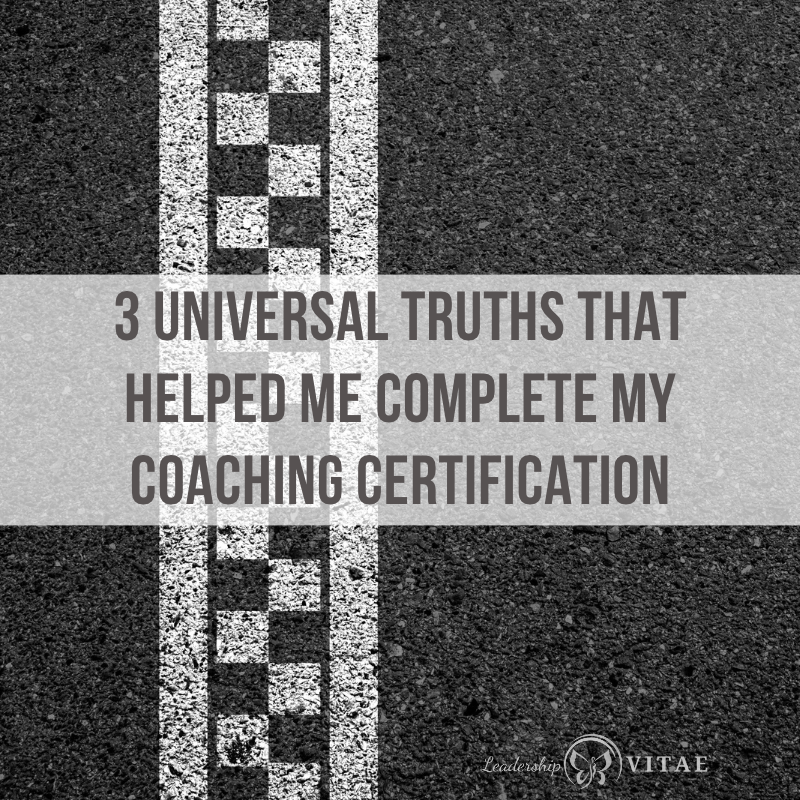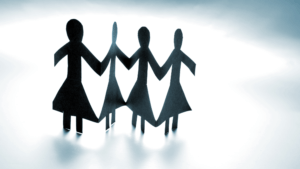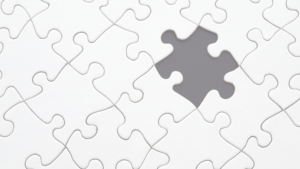
Have you ever pursued something you really wanted and struggled to get to done? Even when you were fired up and couldn’t wait?
Same. Those internal voices that cause us to hesitate and doubt can be intrusive. Make it harder to achieve our goals.
One that I’ve been pursuing for the last five years is my International Coaching Federation (ICF) credential. There have been hundreds of training, study, lab, and coaching hours. You’d think that my confidence would increase as I got close to finishing, where I’d complete an oral and written exam.
It was the opposite.
Having someone evaluate a coaching session was very intimidating. There’s a checklist of markers the evaluator is looking for, which is great to know and attempt to address. However, you can’t sound like you’re working from a checklist. It has to be authentic and natural. Instinctive. Yet hit the boxes. Oh my.
The written exam used to be easier to prepare for but has recently changed. Instead of checking knowledge, you use your judgment of the best and worst answers in a given situation. More on that in a minute.
To get through those last few milestones successfully, I would regularly remind myself (or have friends remind me) of three universal truths. They kept me going when I considered giving up or risked doubt sabotaging my efforts.
Everything feels hard until it’s easy
If something feels effortless, it is almost always after we have put in the work to achieve that state. Otherwise, it’s likely too easy for what we’re capable of.
When I started going to coaching labs, I quickly ran into the challenge of unlearning a lot of what I’d learned over the years. There is absolutely a place in the world for mentor coaches, which is what I had been exclusively to that point. However, learning how to be a pure coach – helping people without feeling the need to be the source of that help – was PAINFUL.
The feedback I received was brutal. It seemed like everyone else “got it” and I somehow was missing out on this magical moment where everything clicked. It never did. Instead, what helped was acknowledgement from the toughest instructor.
She has a similar background, having gotten started as a mentor coach before achieving her coaching credentials. She was able to validate the quality of coaching I was providing AND the rough journey I’d have in unlearning and relearning. By sharing her journey, she also provided an example that it was possible to get there.
It was only with regular practice and feedback, working on one opportunity at a time, that I got better. After months of small moments, it didn’t feel as hard. By the end, it felt…maybe not easy, but comfortable.
When it’s hard, we are tempted to give up. We want easy, but easy comes once we’ve put in the work. Hard means we’re learning. It is the investment we make to get better. We can celebrate once it starts to feel easy…and then look for the next hard as our path to continuous growth.
Instinct only works well when it’s informed
Over the years, I’ve learned to trust my instincts. There’s a lot of information rattling around in my head and I may not be able to consciously consider all of it when making a decision. Have you ever “known” something you can’t definitively defend why?
Consider the brain to be a giant filing cabinet. The filing system is setup in a way to allow us to get to information efficiently. However, there’s so much there that it has to prioritize what to index. Each night, it reshuffles based on what it learned that day about what we need to be able to easily access.
Our instincts tell us when something is just outside the bounds of that indexing system. It’s there and we sense it, but we can’t put our finger on it. That instinct is often worth listening to. Unless it’s ill-informed or uninformed.
When I was studying for the new credential exam, I was able to instinctually recall what I learned regarding the “best” response in a given coaching situation. My struggle was with the worst. My instincts were wired to what I personally felt was wrong or would struggle with as a client.
For example, would it be worse to lie, direct a client, ignore their emotions, or shame them? Personally, I have a hierarchy of bad I can assign to those four things. There is no such hierarchy for coaches.
It took finding someone’s guidance that the worst option was specific to the competency being tested by the question for me to figure out how to study. I had to inform my intuition to stop responding to my personal affronts and really study the competencies to guide my intuition.
Good enough is good enough
Does anyone know whether their doctor had a GPA of a 4.0 or 2.5? If they passed, they are still called Dr, whether they got A’s or C’s.
During my last few reviews in preparation for the oral exam, the instructor told me if I kept doing what I was doing, I was sure to pass. My intuition was improving and I was starting to sense when sessions were hitting the mark. In one peer coaching session, we got to the end and I knew I had it.
Until I went back to review it.
The confidence I had at the end of the session eroded as I checked and realized it wasn’t as good as I thought it was. I had to remind myself that the key was to have a majority of each competency. It didn’t have to be perfect. It had to be better than average.
We can always be better. We are highly unlikely to ever be perfect. Even though it wasn’t off the charts good, I submitted the session for review in hopes it was good enough to pass. The feedback that came back was in the areas I had identified, but most importantly I passed. I had demonstrated sufficient competency, which is enough.
By letting go of perfect, we can allow ourselves the space to be enough. To do enough, contribute enough, and show up enough. If there is no perfect and first place doesn’t exist (which is true in much of our lives), then let’s figure out where we can do and be enough. That way, we can put additional energy and focus to what needs it.
Take the win
As I left the testing center, I got the news that I passed the exam and received my ACC credential. While I was excited, my mind had already started drifting to “what’s next” the day before. I couldn’t even finish the current challenge before worrying about the next one.
It took intention, but I put aside the wonder and decided to take the win. The horizon could wait. Instead, I could enjoy achieving my goal and be proud of the years and effort I’d invested.
Even though I was focused on celebrating, those around me know me too well. I got a lot of “what’s next?” questions when I shared my news. Our friends and family both influence and are influenced by us. What had I taught mine? That there was always a next thing, even before the current thing was done.
Turns out there was more for me to unlearn and relearn, particularly if I want to be the kind of coach (and parent and friend) that models what I write about.
Next time we achieve a goal (no matter how big or small), we can rest for a bit. Yes, there is a beautiful horizon out there for us to conquer. There’s also the hill we’ve climbed today. Let’s take the time to reflect on the journey, take the win, and enjoy the view. We’ve earned it.








